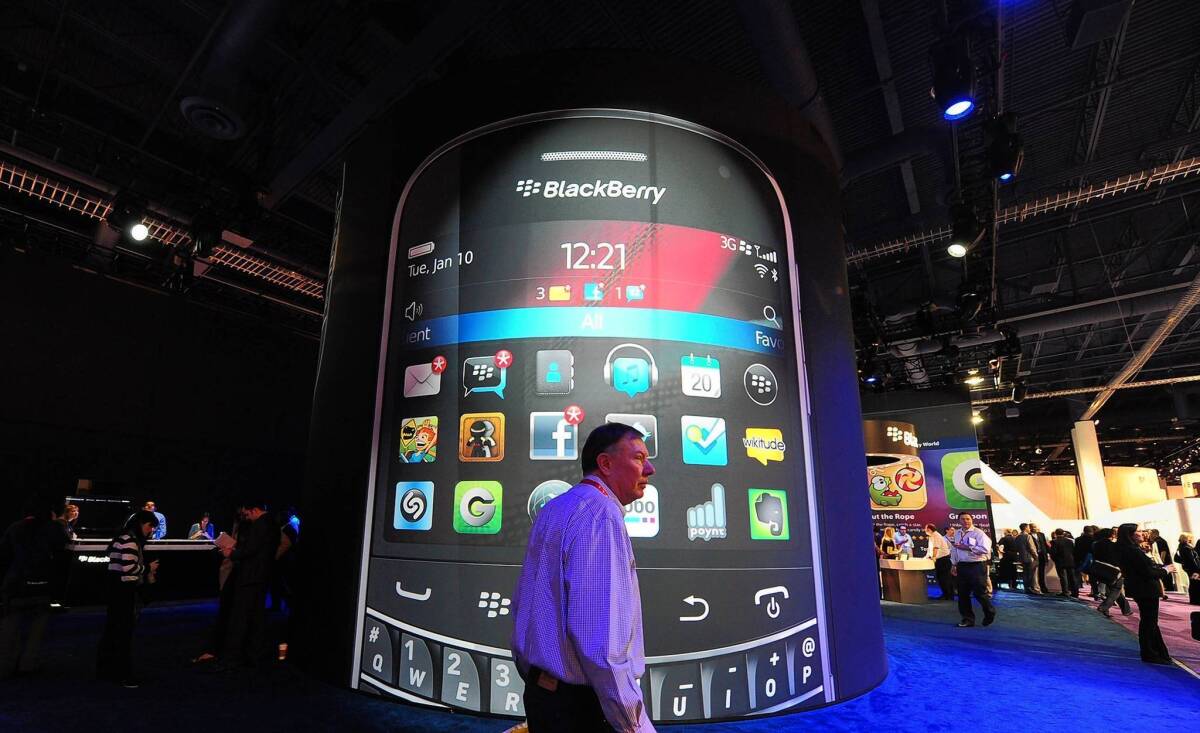Research in Motion hopes for comeback with BlackBerry 10 release

Is BlackBerry maker Research in Motion on the brink of a comeback or does it simply have yet another dud on its hands?
An answer may come Wednesday when the troubled Canadian company releases its long-overdue BlackBerry 10, a new operating system that many analysts believe is RIM’s last chance to become relevant again.
“This is make or break, this is betting the farm,” said Ramon Llamas, research manager of mobile phones for market research firm IDC. “This is very important in the RIM legacy for the company to get it right.”
Live updates: Blackberry 10 unveiling
In the last few years, RIM has lost significant share in the U.S. and other crucial markets as consumers flocked to Apple Inc.’s iPhones and to smartphones running Google Inc.’s Android platform. In an especially devastating blow to RIM, many businesses also have abandoned the brand.
In an elaborate global launch — with events in New York; Toronto; London; Paris; Johannesburg, South Africa; and Dubai — RIM is expected to roll out two smartphones powered by BlackBerry 10, one with a touch screen and the other featuring a traditional keyboard.
In a preview of the touch screen device with The Times this month, RIM showed off a thin black phone with front- and rear-facing cameras, a faster Web browser, a sharp screen resolution and separate profiles for personal and work use.
The company is promising that its touch screen — which executives say can “learn” and adapt to how a user types — will win over users who currently prefer the physical keyboards that BlackBerry has become known for.
Even if BlackBerry 10 is technically strong, some analysts have said the operating system is just too late to the game and faces a tough uphill battle against cooler rivals with loyal customer bases. It was originally slated to launch a year ago.
Besides needing to change the perception of the BlackBerry brand in the minds of consumers, the company will also need to prove that BlackBerry 10 has a rich lineup of apps and innovative features not found on other devices.
Still, RIM’s stock has gotten a lift in recent weeks in anticipation of the big reveal. The company’s depressed shares have doubled in the last three months, although they ended down 52 cents, or 3.2%, at $15.66 on Tuesday.
During an interview with The Times this month, Richard Piasentin, the company’s U.S. managing director, said RIM was being “rational” in its expectations for BlackBerry 10.
“We’re very aware of our market, very aware of our position,” he said. “We have aggressive goals, but they’re reasonable goals. And before you can be No. 1 you’ve got to be No. 2, before you can be No. 2, you’ve got to be No. 3. And we’re building our plans for the long, slow climb back to the top.”
Although RIM executives are busy pumping up the new operating system, they’re also considering alternatives in case BlackBerry 10 fails.
Chief Executive Thorsten Heins said in an interview with German newspaper Die Welt this month that the company would consider licensing its mobile operating system to others in the industry, and also said RIM wasn’t opposed to looking into selling its hardware production business.
RIM could also become an acquisition target. Lenovo Chief Financial Officer Wong Wai Ming said at the World Economic Forum this month that the Chinese computer company was “looking at all opportunities — RIM and many others,” although Lenovo quickly backtracked from those comments.
Regardless, if BlackBerry10 doesn’t catch on with consumers, it would signal more serious trouble for RIM.
IDC reported last week that RIM was the fifth-largest smartphone vendor by shipments in 2012 with 6% worldwide market share, down from 10.3% in 2011.
Going into the BlackBerry 10 launch, RIM is already “several steps behind the starting line,” Llamas said. “When you stand still and the entire market moves ahead, that’s a challenge you have to overcome rather quickly.”
Last month RIM said it saw a decline in its subscriber base for the first time, reporting that the number of customers declined to 79 million in its fiscal third quarter from 80 million in the previous quarter. Revenue for the third quarter was $2.7 billion, down 47% from $5.2 billion in the same quarter a year earlier. The company posted a loss of $9 million, or 2 cents a share, compared with a profit of $265 million, or 51 cents, a year earlier.
Jan Dawson, chief telecom analyst at Ovum, said that with its large subscriber base and no debt RIM could continue to slog along even if BlackBerry 10 is a disappointment. But he still predicted that the company was on its way out.
“Despite the brief bump RIM will see from the launch of BB10, we expect its decline to continue longer term,” Dawson said. “Its glory days are past, and it is only a matter of time before it reaches a natural end.”




